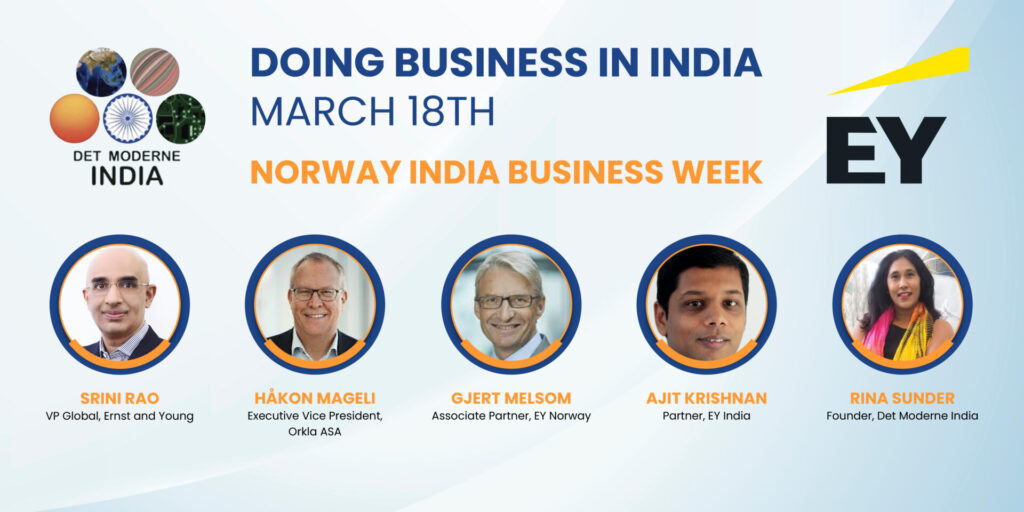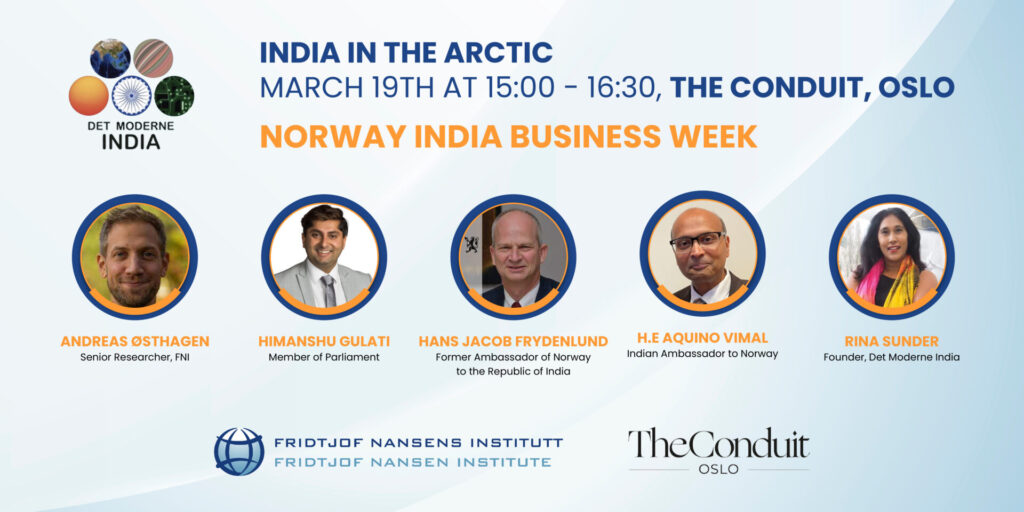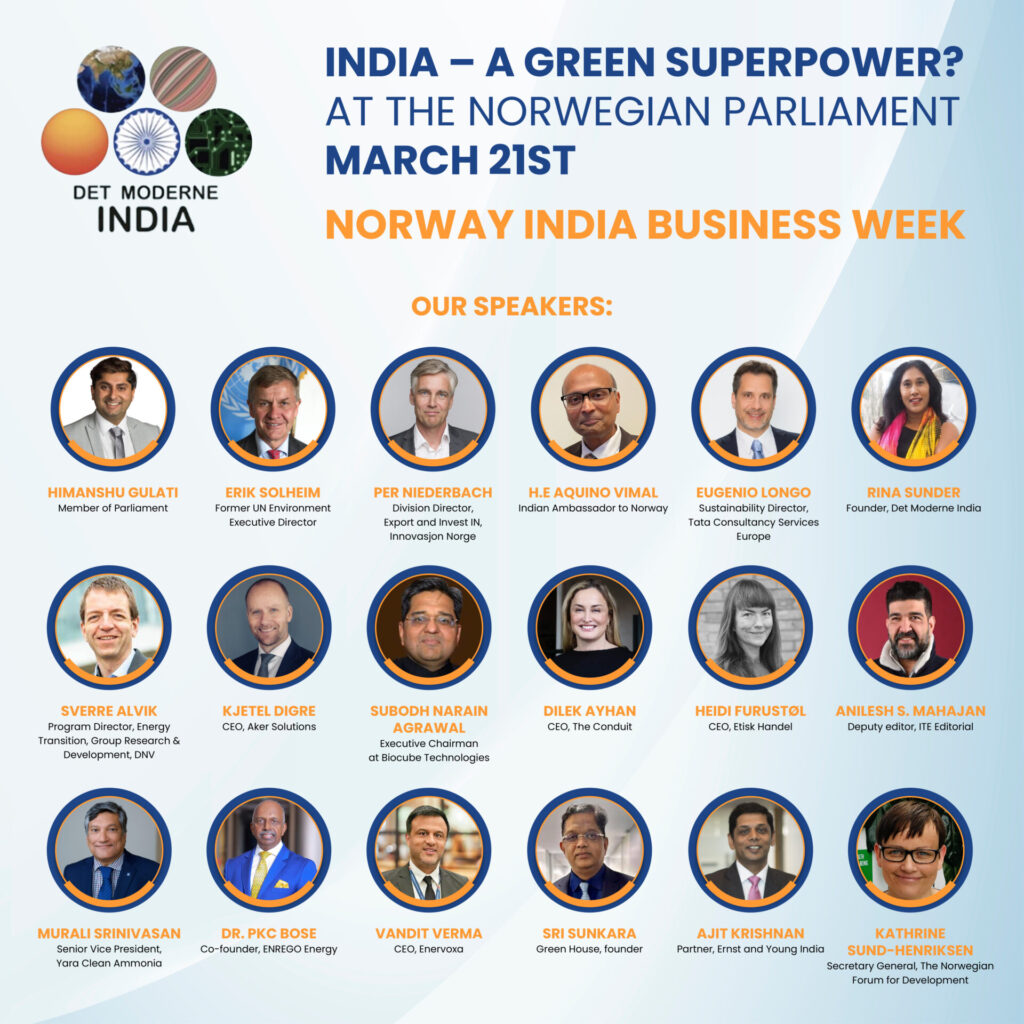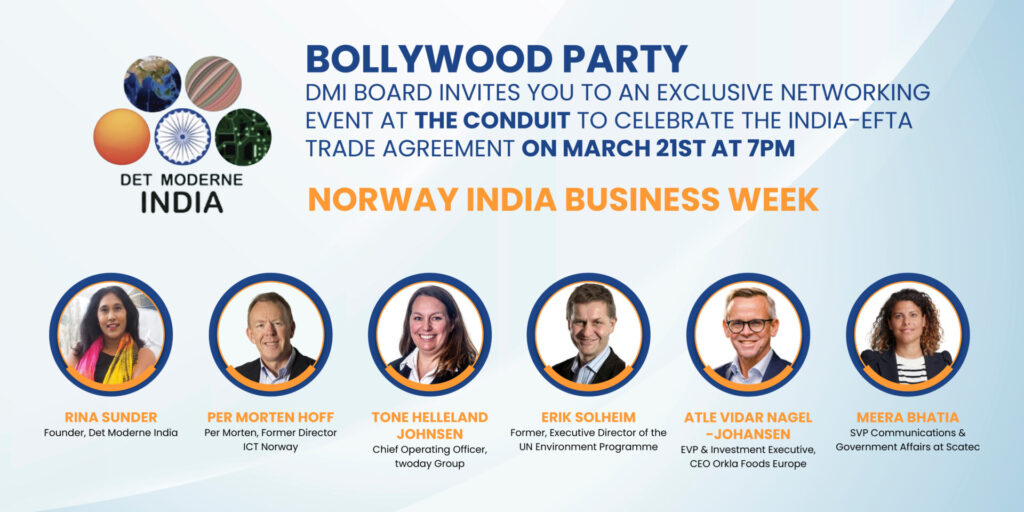DMI is marking its 2-year milestone with a dedicated Norway India Business Week centered on the green shift and the thriving business collaboration between Norway and India.
With the eagerly anticipated visit of Prime Minister Narendra Modi to Norway on the horizon for India Nordic Summit later this year, we are excited to mark this milestone by exploring the vast opportunities for business and partnership between Norway and India.
In the midst of a challenging global landscape, India has emerged as a significant force in both economic and geopolitical spheres. The actions it takes in the upcoming year could pave the way for it to become the world's third-largest economy within five years and a developed nation by 2047. India aims to set a precedent for inclusive, sustainable economic growth, digital development, and climate action.
In 2023, India reached a milestone as it assumed the presidency of the G20, the foremost global economic assembly, showcasing its economic strength and diplomatic acumen on the world stage.
India's commitment to a rule-based international order, its advocacy for collaborative solutions to global issues, and its dedication to democratic principles position it as a stabilizing influence in today's intricate geopolitical landscape. Notably, India has championed a new era of multilateralism, where developing nations play a significant role in shaping global discourse by addressing the concerns of the Global South. During its tenure, India achieved significant milestones, including the inclusion of the African Union in the G20, the establishment of key multistakeholder partnerships like the Global Biofuel Alliance and the Global Initiative on Digital Health, progress towards achieving the United Nations Sustainable Development Goals (SDGs), reforms within multilateral development banks, and advancements in digital public infrastructure.
Economically, India has been a major engine of global growth, contributing 16% to the global GDP growth in 2023. With a growth rate of 7.2% in fiscal 2022-2023, India outpaced most G20 nations and nearly doubled the average growth rate of emerging market economies.
India's focus on stability and structural reforms has bolstered its economic resilience in the face of global challenges. Investments in infrastructure and connectivity projects such as the Bharatmala highway program, the Sagarmala project for port-led development, and the Smart Cities Mission are reshaping the nation's landscape and driving economic progress.
India embarked on its journey toward a digital economy over a decade ago with initiatives like Aadhaar, its national identification program. Today, with a thriving tech industry, India has become a hub for innovation and technology services, propelling both economic growth and its influence in shaping the future of the digital economy.
Against this backdrop, we invite you to join us for an engaging week filled with informative events, distinguished speakers, and discussions centered around unlocking opportunities in the Indian market. Take a look at some of the seminars and events below:

Agenda for the seminar:
08:45-09:00 Mingling/coffee
09:00-09:15 Introduction by EY Norway (host), and DMI (Det Moderne India)
09:15-10:00 India geo-politics and macro-economic outlook
10:00-10:15 Coffee break
10:15-11:15 Key steps for developing and delivering a winning strategy in India
11:15-11:30 Coffee break
11:30-12:00 Brief overview of other fast-growing Emerging Markets
12:00-12:30 Q&A, and open discussions
For more information contact [email protected]

India’s role in global politics is on the rise. India’s development trajectory, coupled with its strategic location and non-aligned history, prompts the need to take a closer look at India’s role in the world.
India’s Arctic Policy document refers to its historical and contemporary engagement in the Arctic region. Although India’s Arctic engagement began a century ago with the signing of the Svalbard Treaty in 1920, its more regular engagement with the region began in 2007, with the launching of its first scientific expedition in the Arctic.
India has shown a continuous commitment since then, with the establishment of a permanent International Arctic research base ‘Himadri’ at Ny-Ålesund, Svalbard, in 2008; deploying a multi-sensor moored observatory ‘IndArc’ in Kongsfjorden in 2014; and setting up its northernmost Atmospheric laboratory in Gruvebadet in 2016. India has also conducted 13 expeditions in the Arctic and currently has 23 ongoing key scientific projects. India is a member of the International Arctic Science Committee, Ny-Ålesund Science Managers Committee, University of Arctic, and Asian Forum of Polar Sciences, and plays an important role in the Arctic scientific community. India’s ties to the Arctic further deepened when it became an observer state in the Arctic Council at the Arctic Council meeting held at Kiruna in 2013, and renewed its status in 2019 in Rovaniemi.
The initial draft policy was structured on 5 pillars: Science and Research, Economic and Human Development, Transportation and Connectivity, Governance and International Cooperation, and National Capacity Building. An important additional pillar of ‘Climate Change and Environmental Protection’ is added, making it a total of 6 pillars on which the Indian Arctic Policy rests, showing its commitment to strengthening international efforts on combating climate change and protection, and harmonising polar research between the two poles and the Himalayan region.
For Norway, the Arctic emerges a primary arena for interaction with India. India has an Arctic policy from 2022 and is increasingly expressing an interest in this part of the world, in tandem with its global rise. This poses certain opportunities, but also challenges, for Norway – which defines the area as the country’s most important strategic priority.
Tuesday March 19th
Time: 15.00 - 16.30
Place: The Conduit
This event is in partnership with Fridtjof Nansens Institute.
For information send an e-mail to [email protected]

The latest IEA report on renewable energy suggests we are broadly on track to triple renewable energy capacity by 2030, provided that we maintain focus and increase momentum. Global renewable energy capacity increased by almost 50% in 2023, and capacity is forecast to increase to 2.5 times its current level by 2030.
However, there are real challenges around scale and speed. So far, progress has been patchy and far too slow. If businesses are to stay competitive, relevant, and afloat in an economy transformed by the energy transition, it is vital that they take their commitments seriously. They need to begin the hard work of implementation and stay on the right side of that transition. This will need to be in lockstep with government action, so that policy certainty, incentives, and energy security are managed alongside rapid decarbonisation.
India is the world's third biggest contributor to climate emissions. The need for green investments in the country is enormous. India has a crucial role to play in solving global climate, environmental, and resource challenges. In a few years, India will become the world's third largest economy, and it plays a key role in global policy development and negotiations on the climate and environment.
Emerging markets such as India have historically low GHG emissions but must ensure that today’s growth and energy demands are met in line with low emission paths. India is determined to implement strategic measures that contribute to reduced climate emissions at the same time as the country further develops independence, also in relation to its energy supply to its citizens and business/industry.
With this as a starting point, DMI invites Norwegian businesses for a conference to discuss India's renewable future. We have with us amazing speakers:
This is a by invitation only event.

Celebrating the EFTA - India Trade Agreement
This week is extra special as Det Moderne India hits the two-year mark, and we're ready to party like never before!
Join us for an unforgettable evening as we commemorate the landmark EFTA - India trade agreement! This agreement is poised to revolutionize economic landscapes, fostering integrated supply chains, opening doors to new opportunities, and catalyzing trade and investment flows between India and the EFTA nations.
Hosted By: The Conduit and Det Moderne India
Date: Thursday, March 21st
Time: 7pm
Location: The Conduit, Kristian Augusts gate 21
Get ready to groove to the beats of Bollywood!
This is a by invitation only event.
As a knowledge hub dedicated to bridging the gap in understanding about India in Norway, we're proud to have surpassed 100 registrations for our anniversary extravaganza three days ahead of the party.
There will be other events during Norway India Business Week, however they remain by invitation only events.